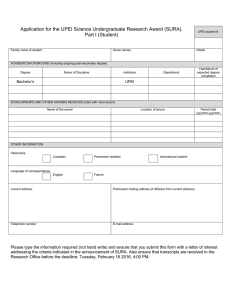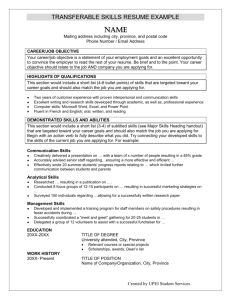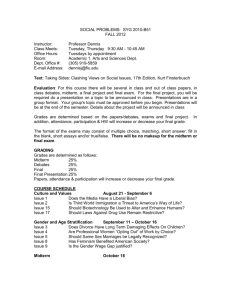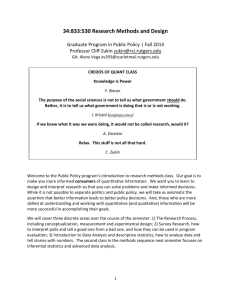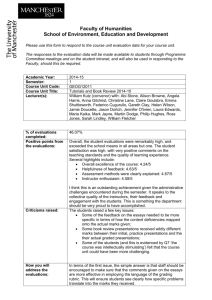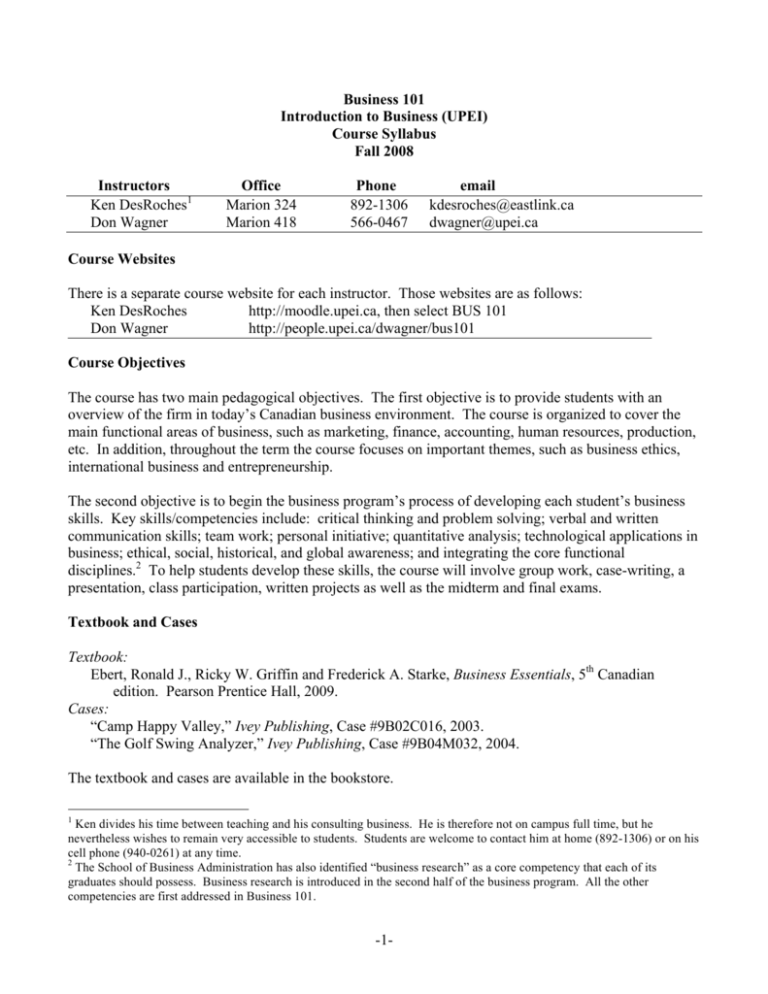
Business 101
Introduction to Business (UPEI)
Course Syllabus
Fall 2008
Instructors
Ken DesRoches1
Don Wagner
Office
Marion 324
Marion 418
Phone
892-1306
566-0467
email
kdesroches@eastlink.ca
dwagner@upei.ca
Course Websites
There is a separate course website for each instructor. Those websites are as follows:
Ken DesRoches
http://moodle.upei.ca, then select BUS 101
Don Wagner
http://people.upei.ca/dwagner/bus101
Course Objectives
The course has two main pedagogical objectives. The first objective is to provide students with an
overview of the firm in today’s Canadian business environment. The course is organized to cover the
main functional areas of business, such as marketing, finance, accounting, human resources, production,
etc. In addition, throughout the term the course focuses on important themes, such as business ethics,
international business and entrepreneurship.
The second objective is to begin the business program’s process of developing each student’s business
skills. Key skills/competencies include: critical thinking and problem solving; verbal and written
communication skills; team work; personal initiative; quantitative analysis; technological applications in
business; ethical, social, historical, and global awareness; and integrating the core functional
disciplines.2 To help students develop these skills, the course will involve group work, case-writing, a
presentation, class participation, written projects as well as the midterm and final exams.
Textbook and Cases
Textbook:
Ebert, Ronald J., Ricky W. Griffin and Frederick A. Starke, Business Essentials, 5th Canadian
edition. Pearson Prentice Hall, 2009.
Cases:
“Camp Happy Valley,” Ivey Publishing, Case #9B02C016, 2003.
“The Golf Swing Analyzer,” Ivey Publishing, Case #9B04M032, 2004.
The textbook and cases are available in the bookstore.
1
Ken divides his time between teaching and his consulting business. He is therefore not on campus full time, but he
nevertheless wishes to remain very accessible to students. Students are welcome to contact him at home (892-1306) or on his
cell phone (940-0261) at any time.
2
The School of Business Administration has also identified “business research” as a core competency that each of its
graduates should possess. Business research is introduced in the second half of the business program. All the other
competencies are first addressed in Business 101.
-1-
Course Websites
Information for the course is posted on the websites listed above, and it is essential that you use the
course website throughout the term. The site provides an up-to-date schedule showing what you need to
complete for each class. The website also has numerous helpful links. We will update the web pages
throughout the term.
Marks
Midterm exam #1
Midterm exam #2
Final exam
Cases (done in teams):
- Camp Happy Valley
- The Golf Swing Analyzer
Presentation (done in teams)
Individual writing assignments:
- Report on a Harvard Business Review article
- Analysis of business ethics presentations
Class participation
10%*
15%*
25%*
10%
10%
10%
4%*
6%*
10%*
To pass the course, you must get at least 50% out of the above 100 possible marks, AND you must get at
least 35 out of 70 on the elements marked by an asterisk. That is, you must earn a passing grade on the
non-group parts of the course to pass the course.
Tests and Exam
There are two midterms and one final exam, as follows:
Midterm #1
Midterm #2
Final exam
Date3
DesRoches sections:
• Tues, Sept 23, in class
Wagner sections:
• Mon, Sept 22, in class
DesRoches sections:
• Thurs, Oct 23, in class
Wagner sections:
• Wed, Oct 22, in class
To be announced when UPEI’s
exam schedule is created
Value
10 marks
Chapters covered
1,2,3,4
15 marks
6,7,8,9
25 marks
5,10,11,12,13,14,15,16
The test questions will require written answers.
3
Dates listed in this syllabus could change due to storms or other unexpected events. Refer to the course web-page for the
most up-to-date schedule for the course.
-2-
To help you prepare for the tests and exam, the course web page provides links to the following:
• Copies of several tests and exams from prior years.
• A list of themes for each chapter. The midterm and exam questions will be designed to test your
mastery of those themes.
• A mini-case for each test. About half of each test’s questions will refer to a mini-case. A copy
of that case will be attached to your test, but it will also be provided on the website in advance.
Before the test, you should familiarize yourself with the facts of the case, so that during the exam
you can maximize the amount of time you devote towards answering the questions. But you do
not need to memorize all the facts of the case, because it will be attached to the exam, enabling
you to look up any details you might need.
Cases
Each student will be assigned to a case-group, which will prepare a case report for two cases. The writeups will be short – 2-4 pages (12 point font, 1½ line spacing). These write-ups should demonstrate
professionalism. That is, they should be thoughtful, clear and free of grammatical mistakes. The course
web page provides a link to a document entitled “Making a compelling business case”,4 which provides
guidance on how to approach cases.
The scheduled due dates for the case write-ups are as follows:
• Camp Happy Valley:
o DesRoches’ sections: Thursday, October 9
o Wagner’s sections: Wednesday, October 8
• The Golf Swing Analyzer:
o DesRoches’ sections: Thursday, November 13
o Wagner’s sections: Wednesday, November 12
If all of the students in a group make equal contributions to the group work, each student in that group
will receive the group’s mark; but if the contributions are unequal, individual students’ marks may vary
from the group’s mark. For example, a student that makes virtually no contribution should obviously
get zero. (See the “peer evaluations” section below.)
Presentation
Each student will be part of a group that makes a presentation on a business ethics issue. There will be
12 groups in each section. The dates we have scheduled for presentations are as follows:
•
DesRoches sections:
o Thursday, October 2
o Tuesday, October 7
o Thursday, November 20
•
4
Wagner sections:
o Wednesday, October 1
o Monday, October 6
o Wednesday, November 19
If you cannot find the link on the course web-page, you can type in the URL address
http://people.upei.ca/dwagner/cases.pdf.
-3-
On each date, four groups from your section will present. You are not expected to attend class on the
presentation dates that your group is not presenting. (Consequently, only one-third of the class will be
there when you present; the smaller audience size makes the presentations a little less intimidating.) But
on the date you are presenting, you must watch and listen to the other three groups’ presentation. As
described below, you are required to submit a written paper based on those other presentations.
The groups will be formed in the third week of the course. At that time a list of topics will be provided.
Your group may choose whichever topic it wants, provided no other group in your section has already
selected it. Once you have made your selection, inform your instructor, and get confirmation from him
that no other group has selected that topic. You are also free to make up your own business ethics topic,
but if you do so you should get your topic approved by your instructor.
Your group’s presentation should run 10 minutes. At the end of the 10 minutes, plan to allow 5 minutes
to field questions or allow comments/debate. The presentation should be informative and interesting;
try to make your presentation a learning experience for the class. Refer to Appendix D of “Making a
compelling business case”5 for suggestions on how to present.
In the class following the date of your presentation, you must submit a peer evaluation that reports the
contributions of each group member. (See the “peer evaluations” section below.) The course web-page
has a link to the peer evaluation form.6
Peer Evaluations
All group members are expected to make significant contributions to their group’s effort. The
responsibilities of each student are laid out in the document entitled “Group work in the business
program,” which is available through a link on the course web page.7 To help ensure that the marks
reflect students’ contributions, each student must submit 3 peer evaluation forms. One must be
completed after each of the two cases and the other must be completed after your presentation. Your
instructor will take these evaluations into account when assigning individuals’ grades for the groupprojects.
Writing Assignment #1 – Report on Harvard Business Review Article
Each student must review and summarize one article from the Harvard Business Review, which can be
found in the library. The summary should be about 1 page in length (12 point font, 1½ line spacing),
and should be submitted by September 30.
The grading of this paper will be based primarily on the quality of the writing.
5
URL address: http://people.upei.ca/dwagner/cases.pdf
URL address: http://people.upei.ca/dwagner/bus101/peerEvaluation.pdf
7
URL address: http://people.upei.ca/dwagner/groupwork.pdf
6
-4-
Writing Assignment # 2 – Analysis of Business Ethics Presentations
In the class that your presentation group makes its presentation, you will also be watching and listening
to three other groups’ presentations. Choose two of those presentations, and write a short paper with the
following for each of those two presentations:
(1) in one paragraph, succinctly describe the essence of the presenting group’s main conclusions;
and
(2) offer your own analysis in any one of the following ways:
a. identify where you disagree with the group’s conclusions and explain why you disagree;
b. identify an aspect of the issue that the group did not address (or only touched on lightly),
and analyze that aspect;8 or
c. identify a situation where the issue applies and explore how well the group’s conclusions
apply to that situation. That situation can be one you have encountered personally, one
that you have read about, or a hypothetical one that you made up.9
Your paper should be approximately 2 pages in length (12 point font, 1½ line spacing). This paper is
due one week after the date of your presentation.
The grading of these papers will focus on:
1. the depth of thought that your paper conveys;
2. your use of the principles covered in Chapter 3’s material on ethics; and
3. the professionalism of your writing.
Class Participation
Another component of your grade is class participation. The skills you need to participate effectively in
class are essentially the same as the skills you will need to participate effectively in business meetings.
The ability and willingness to speak up in front of others is an important skill that you should develop.
Occasionally, there may be circumstances (e.g. accidents, illnesses or emergencies) that prevent you
from attending a class, or prevent you from adequately preparing for a class. In such circumstances,
please let your instructor know, so that he can take into account those circumstances when assigning
your participation grade.
Plagiarism
Throughout your university years (and throughout life) you will face the temptation to cheat. Cheating
and plagiarism are serious violations of the university’s standards on academic honesty. Don’t cheat
and don’t plagiarize. If you are referring to other people’s work, make sure you cite your sources.
8
For example, if the group presented on ethical issues of outsourcing production to low-cost countries, but did not address
how outsourcing can affect the environment, you can delve into that. (Since each of the ethical issues in our list of topics is
huge, the presenting group can’t possibly address all of the issues in a presentation that is only 10 minutes. There will
therefore be plenty of scope for you to pick an aspect that the presenting group did not address.)
9
For example, if the group presented on ethical issues of outsourcing production, you could address how the group’s
conclusions would apply to a specific situation (e.g. Nike’s practice of outsourcing shoe production to Indonesia, or Dell’s
(former) practice of outsourcing technical support to India).
-5-

